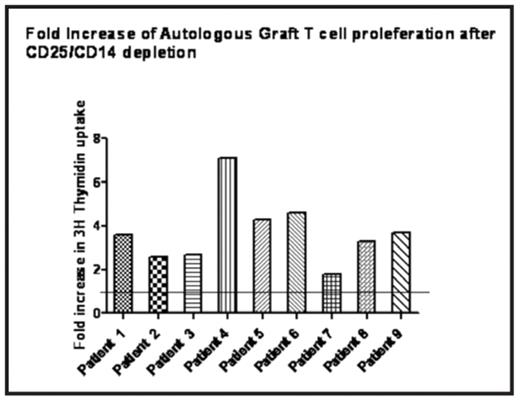Abstract
Background: Despite the demonstrated efficacy of high dose chemotherapy and autologous hematopoietic stem cell transplantation in Myeloma and relapsed Lymphoma, relapse continues to be a problem. Improving post transplant immune reconstitution in general and tumor specific immune response can reduce relapse rates. Pre-clinical and clinical data suggest that the abundance of CD4+/CD25+ regulatory T-cells (T-regs) and CD14+ monocytes in the autologous graft can contribute to the well described immune suppression state in the early months post transplant. We hypothesized that it is feasible to deplete both of these cellular inhibitory elements from the autologous grafts using clinical grade CD25 and CD14 magnetic beads from Miltenyi. We also hypothesized that the depletion of these populations would improve the proliferative capacity of T-cells in these grafts.
Methods: Samples of peripheral blood hematopoietic stem cell grafts from 9 patients (4 lymphomas and 5 myelomas) undergoing autologous stem cell transplantation, with G-CSF mobilized grafts. We depleted T regs and monocytes, using CD25 and CD14 beads from these graft samples. Then we compared T cell reactivity between the manipulated graft versus the unmanipulated graft samples, in a mixed lymphocyte reaction.
Results: We show that it is feasible to deplete both populations based on phenotype analysis that confirmed selective depletion of CD4+/CD25+/CD127-T reg population (70–80%) and CD14 population (74%.). The positively selected population was enriched for T regs CD4+CD25+CD127-(50–85%) and monocytes CD14+ (75%+). Furthermore in 9 out of 9 patients T cell proliferation measured by 3H thymidine uptake was close to two fold or higher in the double depleted grafts compared to the unmanipulated grafts (P=0.004 Wilcoxon Signed Rank Test).
Conclusion: Double depletion of T regs and monocytes from autologous grafts using clinical grade magnetic beads, leads to enhanced T cell proliferation. This work will lay the ground for a subsequent clinical trial of regulatory T-cell/Monocyte depleted autologous transplantation using the same strategy, to enhance immune recovery post transplant and achieve better anti-lymphoma, or anti-myeloma immune response.
Disclosures: No relevant conflicts of interest to declare.
Author notes
Corresponding author


This feature is available to Subscribers Only
Sign In or Create an Account Close Modal